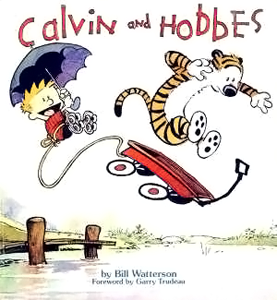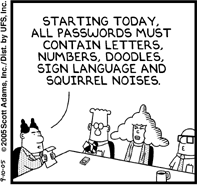
William Boyd Watterson II is an American cartoonist who authored the comic strip Calvin and Hobbes. The strip was syndicated from 1985 to 1995. Watterson concluded Calvin and Hobbes with a short statement to newspaper editors and his readers that he felt he had achieved all he could in the medium. Watterson is known for his negative views on comic syndication and licensing, his efforts to expand and elevate the newspaper comic as an art form, and his move back into private life after Calvin and Hobbes ended. Watterson was born in Washington, D.C., and grew up in Chagrin Falls, Ohio. The suburban Midwestern United States setting of Ohio was part of the inspiration for Calvin and Hobbes.
Bill Holbrook is an American cartoonist and webcomic writer and artist, best known for his syndicated comic strip On the Fastrack.

A comic strip is a sequence of cartoons, arranged in interrelated panels to display brief humor or form a narrative, often serialized, with text in balloons and captions. Traditionally, throughout the 20th and into the 21st century, these have been published in newspapers and magazines, with daily horizontal strips printed in black-and-white in newspapers, while Sunday papers offered longer sequences in special color comics sections. With the advent of the internet, online comic strips began to appear as webcomics.

Calvin and Hobbes is a daily American comic strip created by cartoonist Bill Watterson that was syndicated from November 18, 1985, to December 31, 1995. Commonly cited as "the last great newspaper comic", Calvin and Hobbes has enjoyed broad and enduring popularity, influence, and academic and philosophical interest.

Dilbert is an American comic strip written and illustrated by Scott Adams, first published on April 16, 1989. It is known for its satirical office humor about a white-collar, micromanaged office with engineer Dilbert as the title character. It has spawned dozens of books, an animated television series, a video game, and hundreds of themed merchandise items. Dilbert Future and The Joy of Work are among the most read books in the series. In 1997, Adams received the National Cartoonists Society Reuben Award and the Newspaper Comic Strip Award for his work. Dilbert appears online and as of 2013 was published daily in 2,000 newspapers in 65 countries and 25 languages.

Milton Arthur Paul Caniff was an American cartoonist famous for the Terry and the Pirates and Steve Canyon comic strips.

Pooch Café is a Canadian-American gag-a-day comic strip written and illustrated by Paul Gilligan. It was also made into a series of online shorts with RingTales.
Lucky Cow is a syndicated comic strip created by Mark Pett and distributed by Universal Press Syndicate. It focuses around the fictional fast food chain Lucky Cow and its workers. In the strip, the restaurant's advertisements advocate obesity and unhealthy eating habits.

Richard Church Thompson was an American illustrator and cartoonist best known for his syndicated comic strip Cul de Sac and the illustrated poem "Make the Pie Higher". He was given the Reuben Award for Outstanding Cartoonist of the Year for 2010.
Raymond Curtis Billingsley is an African American cartoonist, best known for creating the comic strip Curtis. It is distributed by King Features Syndicate and printed in more than 250 newspapers nationwide.

Francis A. "Fran" Matera was an American comic strip artist best known for his King Features Syndicate adventure strip Steve Roper and Mike Nomad from 1984 to 2004. In addition to his extensive experience in newspaper strips, Matera also spent many years in the comic book industry, particularly for Charlton Comics. His influences include Hal Foster, Alex Raymond, Milton Caniff, Al Capp, and Bud Fisher.

Richard S. Newcombe is the founder and chairman of Creators Syndicate, which currently represents more than 200 writers and artists and has expanded to include Creators Publishing. Since the company's founding in 1987, the roster of talent has included Ann Landers, Dear Annie, Hillary Clinton, Bill O'Reilly, Hunter S. Thompson, Herblock and the comic strips B.C., The Wizard of Id, Archie and Mickey Mouse. Creators Syndicate is located in Hermosa Beach, California, and distributes its content to 2,400 newspapers, magazines, websites and other digital outlets around the world.

Creators Syndicate is an American independent distributor of comic strips and syndicated columns to daily newspapers, websites, and other digital outlets. When founded in 1987, Creators Syndicate became one of the few successful independent syndicates founded since the 1930s and was the first syndicate to allow cartoonists ownership rights to their work. Creators Syndicate is based in Hermosa Beach, California.

Allen Saunders was an American writer, journalist and cartoonist who wrote the comic strips Steve Roper and Mike Nomad, Mary Worth and Kerry Drake.
Charles Boyce, is an American cartoonist known for his syndicated comic panel Compu-toon. Boyce is also known for creating the KeyPad Kid, a cartoon character used in public affairs awareness programs for training within the telecommunication industry.

The McNaught Syndicate was an American newspaper syndicate founded in 1922. It was established by Virgil Venice McNitt and Charles V. McAdam. Its best known contents were the columns by Will Rogers and O. O. McIntyre, the Dear Abby letters section and comic strips, including Joe Palooka and Heathcliff. It folded in September 1989.

Sheldon "Shel" Dorf was an American comic book enthusiast and the founder of San Diego Comic-Con International. Dorf was also a freelance artist and graphic designer, who lettered the Steve Canyon comic strip for the last 12 to 14 years of the strip's run.

Andrews McMeel Syndication is an American content syndicate which provides syndication in print, online and on mobile devices for a number of lifestyle and opinion columns, comic strips and cartoons and various other content. Some of its best-known products include Dear Abby, Doonesbury, Ziggy, Garfield, Ann Coulter, Richard Roeper and News of the Weird. A subsidiary of Andrews McMeel Universal, it is headquartered in Kansas City, Missouri. It was formed in 2009 and renamed in January 2017.
Kurt Erichsen is an openly gay cartoonist and civil engineer, creator of the syndicated LGBT-themed comic strip "Murphy's Manor," his most notable work, which ran for 1183 weekly strips from the 1980s until 2008 and through strip 1205 in 2019.
William Raphael Louis Dwyer, Jr., known as Bil Dwyer, was an American cartoonist and humorist. He was known for several newspaper comic strips in the 1930s and 1950s, including Dumb Dora and Sandy Hill, as well as a series of humorous books of Southern slang published in the 1970s.













